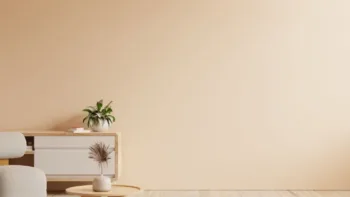
Are you feeling overwhelmed by clutter and the endless quest for more stuff? Maybe it’s time to jump on the bandwagon and embrace a minimalist lifestyle. Minimalism isn’t just about getting rid of things; it’s about making room for what truly matters.
By embracing a minimalist lifestyle, you’ll find that less truly is more. You may gain more peace, time, and happiness by focusing on what matters most.
Plus, you can always start small! It just might lead to you staying committed and enjoying the benefits of a simpler, more fulfilling life. Let’s explore the benefits of minimalism and some practical tips to help you get started.
What is Minimalism?
Minimalism is a lifestyle choice that emphasizes simplicity and intentionality. It’s about focusing on what truly matters by reducing excess possessions, commitments, and distractions. The goal is to create more physical and mental space for things that add value and joy to your life.
5 Key Principles of Minimalism
- Intentional Living – Minimalism encourages living with purpose. Every item and activity should serve a meaningful role in your life. This means carefully considering your purchases and commitments, ensuring they align with your values and goals.
- Decluttering – A major aspect of minimalism is removing items that no longer serve a purpose or bring joy. This process isn’t just about getting rid of things but about making room for what’s important.
- Simplicity – Minimalism seeks to simplify all aspects of life, including your home, schedule, and even your mindset. By eliminating unnecessary complexity, you may be able to focus more on what truly matters.
- Quality Over Quantity – Minimalism prioritizes quality over quantity. Instead of having many things, minimalists prefer to have fewer, high-quality items that last longer and bring more satisfaction.
- Mindfulness – Minimalism promotes mindfulness—being present and fully engaged in the moment. This practice can help you appreciate what you have and make more thoughtful decisions.
Why Choose Minimalism?
Clutter can be a major source of stress. When your space is organized and free of unnecessary items, you create a calm environment that helps you relax and focus on what’s important.
By buying less, you save more. It’s as simple as that. Minimalism encourages thoughtful spending, which means you’ll have more money for experiences and things that bring you joy. Less stuff means less cleaning and maintenance, which frees up time to pursue hobbies, spend time with loved ones, or just relax.
Minimalism is also great for the planet. Reducing your consumption reduces your environmental footprint and contributes to a more sustainable world.
So, what does it look like? Here is a quick glimpse at minimalism in practice:
- A minimalist home is clean, organized, and free of clutter. Each room contains only functional items that bring joy, creating a peaceful and inviting space.
- In the workplace, minimalism can mean prioritizing tasks, avoiding unnecessary meetings, and keeping a tidy workspace. This approach can boost productivity and reduce stress.
- Financial minimalism involves mindful spending and saving. It means avoiding debt, living within your means, and spending money on experiences and things that truly matter.
- Minimalism in relationships focuses on quality over quantity. It’s about nurturing deep, meaningful connections rather than maintaining a large number of superficial ones.
- A minimalist lifestyle extends to how you spend your time. It encourages you to engage in activities that align with your passions and values and to say no to commitments that don’t add value to your life.
In essence, minimalism is about stripping away the excess to make room for what truly enriches your life. It’s a journey towards more intentional living, where less truly becomes more.
7 Tips to Get Started with Minimalism
1. Start with a Plan
Begin by setting clear goals. Decide which areas of your home need the most attention and tackle one space at a time. This way, you won’t feel overwhelmed by the process.
2. Declutter Your Wardrobe
Go through your clothes and donate items you no longer wear. Search for “donate clothes near me” to find local organizations that will gladly take your gently used items. Some charities even offer furniture donation pick-up services, making it easier to declutter larger items without the hassle.
3. Optimize Your Storage
Invest in modular closet systems for better organization in almost every room. These systems allow you to customize your storage solutions to fit your needs, keeping everything in its place and making it easier to find what you need. You can even find garage organization systems to help keep storage items out of the way.
4. Embrace the One-In-One-Out Rule
To prevent future clutter, adopt the one-in-one-out rule. For every new item you bring into your home, donate or discard an old one. This helps maintain balance and keeps clutter at bay.
5. Digitize Where Possible
Paper clutter can quickly pile up. Scan important documents and store them digitally. This saves space and makes it easier to organize and access your files.
6. Simplify Your Decor
Choose decor that is both functional and beautiful. Avoid overdecorating and opt for a few meaningful pieces you truly love. This creates a serene and cohesive look in your home.
7. Practice Mindful Shopping
Before purchasing, ask yourself if you truly need the item and if it will add value to your life. This practice helps curb impulse buying and ensures that your possessions are meaningful.
Benefits of Decluttering
- Boosts Productivity – An organized space can significantly improve your focus and productivity. With fewer distractions, you can accomplish tasks more efficiently.
- Improves Mental Health – A clean and organized environment can enhance your mental well-being. It can promote a sense of control and reduces anxiety, leading to a more positive outlook on life.
- Enhances Creativity – A clutter-free space can spark creativity. With fewer visual distractions, your mind is free to wander and come up with new ideas.
If you’re ready to declutter, remember to look up “donate clothes near me” for convenient donation options and consider furniture donation pick up services for larger items. Modular closet systems can revolutionize your organization, making the minimalist journey smoother and more enjoyable. Happy decluttering!



